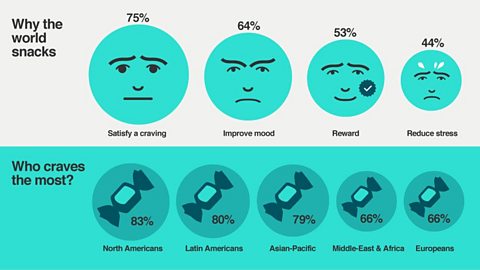How can I resist a food craving?

Food cravings are notoriously difficult to resist. A waft of doughnuts frying, a glimpse of salty chips or the rustle of a crisp packet can lead even the strongest willed of us to quickly break our healthy eating resolve.
Cravings are linked to memory. When we eat a food we like, we create a positive memory. When we associate a food with happy memories, it affects how good we think it tastes and how good it makes us feel, according to Professor Carey Morewedge of Boston University. The more we eat of that food, the more we reinforce this memory. When these positive memories are formed they intrude on our consciousness as a craving. A smell, feeling or place can recall the memory and bring on a craving.
Cravings are closely linked to reward centres in the brain. Carb-loaded foods such as sugary drinks and chips trigger a pathway of signals to these reward centres, while fatty foods such as cheese take a different route. Mix carbs and fat together, in an ice cream or chocolate for instance, and those reward centres are reinforced, according to research from Yale University. So your brain rewards you for satisfying cravings for these foods.
What makes a craving stronger?
Our emotions and lifestyle can make cravings harder to resist. Here are some factors that have been shown to weaken resolve.
- Stress: Snacking on crisps, chocolate and biscuits has been associated with higher stress.
- Higher levels of boredom and anxiety.
- Daytime sleeping has been linked to cravings, while poor or unusual sleep patterns have been associated with a higher body mass index (BMI).
- Restrictive diets have been shown to increase cravings.
5 ways to stop cravings
There are a number of theories about how to help yourself resist a food craving, or even prevent the craving.
Drink more water. A study found that drinking 500ml of water before a meal helped people to lose weight.
Imagine eating a food many times, as this has been shown to reduce your consumption of that food, according to research from Professor Morewedge. Worth a go!
Get moving. Chocolate cravings were reduced when people did some quick exercise.
“Make sure you've eaten enough at mealtimes to stop you reaching for sugary treats in the afternoon or evening”, says senior therapist Sally Baker.
“If you're feeling stressed, anxious or even just bored, you could do something other than eat to get yourself out of that negative mood”, says Sally Baker. “Taking a walk in a park works for many people, meeting up to chat with friends or even a bath can be much more satisfying than turning to a snack and more likely to make you feel better.”
How and why does repeatedly thinking about a food help us resist a craving? Professor Carey Morewedge explains his theory to Dr Chris van Tulleken.
Chocolate craving
Professor Carey Morewedge explains his theory to Dr Chris van Tulleken
Chris: So ok, we’ve got people in a room with the bowls of chocolate, asking them to think about chocolate. This seems like a bizarre way of trying to get them to eat less chocolate.Carey: It does seem bizarre, but it’s really based on some good science about how cravings are formed.Chris: So we all have cravings, or most of us do. What’s going on in the booths at the moment with the chocolate in front of our participants?Carey: Right, so we have 30 pieces of chocolate in each of the booths. And the idea is that those 30 chocolates are basically stimulating a craving. So cravings are often formed through a memory that we have. We may have a memory about a positive time that we ate chocolate, we may think about the taste of a chocolate that we once had. And so all these different kinds of cuescan lead us to think about how positive it would be to have it and to notice how unpleasant it is that we aren’t eating chocolate right now.Chris: OK, so to have a craving you’ve got to have had a positive experience?That’s what a craving is – it’s about memory, it’s not a kind of physical addiction to the substance?Carey: Right, so we don’t think that any of these people are necessarily addicted to chocolate. But the basic idea is that they’ve had positive experiences with chocolate in the past.Chris: Since I was a kid what we get told is just avoid it: avoid it physically, avoid thinking about it, avoid it mentally. Why can’t we just to do that?Carey: Right, that intuitively seems to make sense, but it’s problematic because of memory as well. So when we try to avoid thinking about something - like right now try not to think of a white bear, immediately, right, you think about a white bear? And so what we find is that when people try to suppress thoughts of something it tends to actually activate those thoughts and they’re more likely to have them.Chris: And that’s certainly true, in my own experience – with foods, with anything pleasurable – trying to avoid it makes it more desirable. So OK, we’re asking them to think about eating the chocolate as a way of reducing their chocolate intake, as a way of decreasing temptationCarey: No, it does seem crazy right?Chris: If it’s effective it will be a more enjoyable way of resisting a craving that the attempt at, kind of, blanking our minds?Carey: yeah, that’s the hope.
Who snacks the most?
